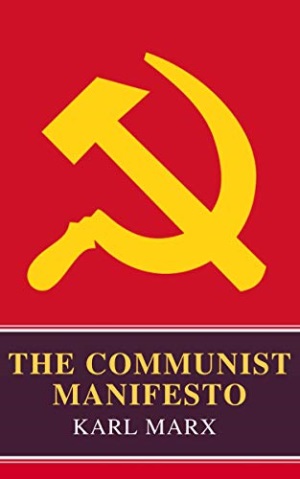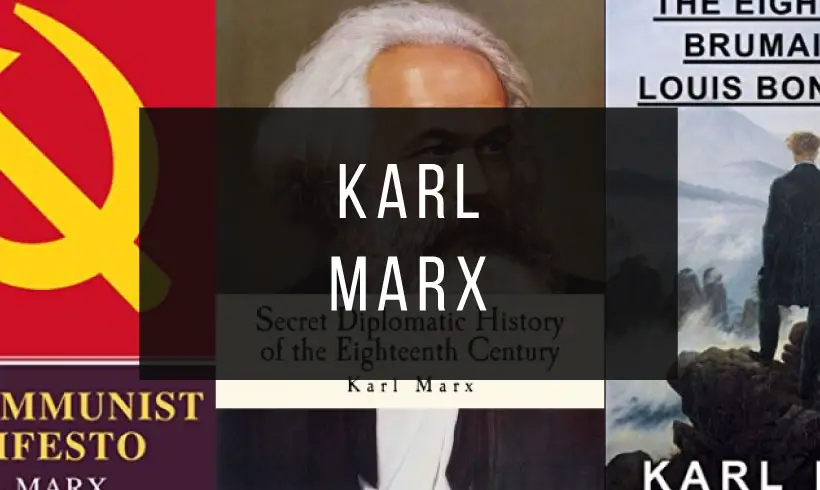Today we bring a compendium with the best books of Karl Marx in PDF format. But first, a little history about the creator of Marxism.
Karl Heinrich Marx was one of the nine children of Heinrich and Henriette Marx in Trier, Prussia. His father was a successful lawyer who revered Kant and Voltaire, and was a passionate activist for Prussian reform.
Although both parents were Jews of rabbinical descent, Karl’s father converted to Christianity in 1816, at the age of 35. When he was 6 years old, Karl was baptized along with the other children.
Marx was an average student. He was home-schooled until the age of 12 and spent five years, from 1830 to 1835, at the Jesuit high school in Trier. The headmaster of the school, a friend of Marx’s father, was liberal and Kantian, and the authorities considered it suspicious.
In October 1835, Marx entered the University of Bonn. In his two semesters there, he was imprisoned for drunkenness and disorderly conduct, incurred debts, and participated in a duel. At the end of the year, Marx’s father insisted that he enroll at the more serious University of Berlin.
In Berlin, he studied law and philosophy and became acquainted with the philosophy of G.W.F. Hegel. At first, Marx was not attracted to Hegel, but he soon became associated with the young Hegelians, such as Bruno Bauer and Ludwig Feuerbach, who criticized the politics and religious institutions of the time.
In 1836, Marx became secretly engaged to Jenny von Westphalen, from a respected Trier family, four years his senior. This, along with his growing radicalism, caused his father distress.
Marx received his doctorate from the University of Jena in 1841, but his radical politics prevented him from obtaining a teaching position. He began working as a journalist and, in 1842, became editor of the Rheinische Zeitung, a liberal newspaper in Cologne. Only a year later, the government ordered the newspaper suppressed. In June he finally married Jenny von Westphalen, and in October they moved to Paris.
In Paris, together with Arnold Ruge, Marx founded a political journal entitled German-French Annals. Only one issue was published before philosophical differences between Marx and Ruge caused its demise, but in August 1844, the journal reunited Marx with a collaborator, Friedrich Engels, who would become his lifelong collaborator and friend. Together, they began writing a critique of Bruno Bauer’s philosophy. The result of Marx and Engels’ first collaboration was published in 1845 under the title The Holy Family.
That same year, Marx moved to Belgium after being expelled from France while writing for another radical newspaper, Vorwärts! In Brussels, Moses Hess introduced Marx to socialism. He wrote «The German Ideology», in which he first developed his theory of historical materialism.
In early 1846, Marx founded a Communist Correspondence Committee in an attempt to unite socialists throughout Europe. Inspired by his ideas, socialists in England held a conference and formed the Communist League, and in 1847, at a Central Committee meeting in London, the organization asked Marx and Engels to write The Communist Manifesto.
This work was published in 1848, and soon after, in 1849, Marx was expelled from Belgium. He went to France, but was also deported from there. Prussia refused to accept him, so Marx moved to London. Although Britain denied him citizenship, he remained in London until his death.
In London, Marx helped found the German Workers’ Educational Society and a new headquarters for the Communist League. He continued to work as a journalist for 10 years as a correspondent for the New York Daily Tribune, from 1852 to 1862, but never earned a living wage and was largely supported by Engels.
Marx focused increasingly on capitalism and economic theory, and in 1867 published the first volume of his work on economics «Capital». The rest of his life was spent writing and revising manuscripts for additional volumes, which he never completed.
Marx died of pleurisy in London on March 14, 1883.
1) The Communist Manifesto

The Communist Manifesto, often referred to as the Manifesto of the Communist Party, is one of the most influential political treatises in history. It is a manifesto commissioned by the Communist League from Karl Marx and Friedrich Engels between 1847 and 1848, and first published in London on February 21, 1848.
It is an early text by Marx and Engels, already reflecting the fundamentals of Marxism, including the materialist conception of history. However, it still predates the development of Marxist economics, as well as the historical events that would render some aspects of the manifesto obsolete, according to Marx and Engels themselves.
2) The Eighteenth Brumaire of Louis Bonaparte

The Eighteenth Brumaire of Louis Bonaparte is a work written between December 1851 and March 1852, published in the journal «Die Revolution», founded by Joseph Weydemeyer, a friend of Marx, and published in German in New York.
In this work Marx tries to expose how the coup d'état of December 2, 1851 in Paris, given by Louis Bonaparte, was propitiated as a result of the class conflict and the material conditions that each of them defended.
The text begins with Marx's famous phrase "…great historic facts… recur twice… once as tragedy, and again as farce", thus parodying the coup given by Louis Napoleon Bonaparte as an inferior imitation of the real Eighteenth Brumaire: the coup given on November 9, 1799 (18th Brumaire of the year VIII, according to the republican calendar) by Napoleon Bonaparte.
3) Theses on Feuerbach

The Theses on Feuerbach are eleven short philosophical notes written in 1845. They summarize a critique of the ideas of the young post-Hegelian philosopher Ludwig Feuerbach. However, this text is usually considered more broadly, since it criticizes the contemplative materialism of the young Hegelians in all forms of philosophical idealism.
The theses would come to explicitly underline the role that praxis, action, was to play according to the Marxist worldview. In doing so, Marx intended to make the break with Hegel that the idealists -among them Feuerbach- had failed to achieve. These idealists would make, according to Marx's critique, a powerful but too abstract philosophy.







































